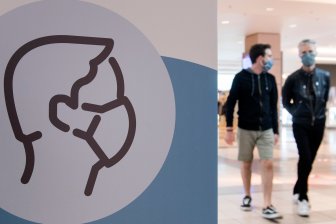‘Freedom Convoy’ did not pose security threat under CSIS Act: director

Liberal cabinet ministers deemed last winter’s “Freedom Convoy” protests a threat to national security, despite warnings from the federal intelligence agency that threshold was not met, an inquiry into the use of the Emergencies Act learned Monday.
Prime Minister Justin Trudeau invoked the act on Feb. 14, arguing its temporary and extraordinary powers were needed to end blockades in Ottawa and at border crossings.
The legislation says a public order emergency is one that comes from a “serious threat to the security of Canada, as defined by the Canadian Security Intelligence Service Act.”
Read more:
Senior civil servants testify at Emergencies Act inquiry
Read More
-
![]()
Senior civil servants testify at Emergencies Act inquiry
The definition includes espionage or sabotage of Canada’s interests, foreign-influenced activities, or the violent overthrow of the government.
The Public Order Emergency Commission, which is holding hearings in Ottawa until Nov. 25, is tasked with determining whether the government was justified in triggering the legislation.
A document summarizing the evidence from David Vigneault, director of CSIS, shows he believed the protest “at no time” posed a threat to Canada’s security and that there were no signs of foreign interference.
“He felt an obligation to clearly convey the service’s position that there did not exist a threat to the security of Canada as defined by the service’s legal mandate,” said the document, which was released on Monday through the public inquiry.
CSIS was, however, monitoring subjects of intelligence investigations who were taking part in the protests.

Vigneault, who is expected to testify before the commission next week, advised cabinet that invoking the Emergencies Act could further inflame extreme anti-government rhetoric.
Rob Stewart, who was deputy minister of public safety at the time of the protests, told the commission on Monday that the government would have a more broad interpretation of what constitutes a national security threat.
“The cabinet is making that decision and their interpretation of the law is what governs here,” Stewart told the commission. “And their decision was evidently that the threshold was met.”
Brendan Miller, a lawyer for the Ottawa “Freedom Convoy” protesters, suggested that no federal agency advised cabinet that the protest posed a national threat, as defined in the legislation.
“You have the RCMP, you have CSIS, you have the entire intelligence apparatus in the federal government and none of them said that this threshold was met, did they?” Miller asked Stewart during cross-examination Monday.
“They weren’t asked,” Stewart said.

The government worried that the longer the protest went on, the more likely it was that ideologically motivated violent extremists would take advantage of the situation, said Dominic Rochon, the senior assistant deputy minister of the national and cybersecurity branch of the government.
“That was a significant concern for the security intelligence community,” Rochon said during his testimony Monday.
By the time the act was invoked on Feb. 14, Ottawa streets had been barricaded by large idling trucks and huge groups of protesters calling for an end to COVID-19 public health restrictions for weeks, forcing the closure of many businesses in the downtown area.
Two major international border crossings in Alberta and Ontario had recently been cleared, but other smaller demonstrations continued across the country.
In a letter to premiers on Feb. 15, Trudeau said the federal government believed the situation reached a point “where there is a national emergency arising from threats to Canada’s security.”
“We are facing significant economic disruptions, with the breakdown of supply chains. This is costing Canadians their jobs and undermining our economic and national security, with potentially significant impacts on the health and safety of Canadians,” he wrote.
“It is affecting Canada’s reputation internationally, hurting trade and commerce, and undermining confidence and trust in our institutions.”
Read more:
Ontario government missing during ‘Freedom Convoy’ in Ottawa, inquiry hears
The testimony Monday provided the commission with its first look behind the curtain at cabinet discussions before they invoked the act for the first time since it replaced the War Measures Act in 1988.
As early as Feb. 7, John Ossowski, who was then-president of the Canada Border Services Agency, suggested to federal, provincial and territorial officials that the Emergencies Act could be used to compel tow truck drivers to help remove large rigs, the commission has learned.
On Feb. 10, cabinet formally discussed the idea of invoking the act. A summary of notes from an emergency cabinet committee meeting that day says Trudeau raised the notion of two tracks forward: actions that could be undertaken under existing authorities, and the process of invoking the Emergencies Act.
Most of the details from the ensuing discussion have been blacked out.
Cabinet ministers did consider plans to engage with the organizers of the “Freedom Convoy” in Ottawa in an effort to shrink the protest.

Stewart tolda cabinet committee on Feb. 8 that 80 per cent of protesters in Ottawa had a “weak” connection to the protest.
An Ontario Provincial Police negotiator suggested protest leaders might be encouraged to leave and denounce the blockade in exchange for being able to register their complains with the federal government.
It was hoped many demonstrators would then leave before police moved in to clear the protest, but the idea was abandoned after a discussion among ministers.
Stewart says the effort was not co-ordinated with other attempts by the provincial and municipal governments to engage with the protest organizers.
Read more:
Emergencies Act should be ‘once-in-a-generation’ kind of tool: Freeland
When preparing to brief the public on the government’s decision to invoke the act, Stewart encouraged staff to come up with examples of ways police could use the new powers to quash the protests and stop new ones from cropping up, according to an email released by the public inquiry.
“I’m afraid I don’t have a lot of great ideas because there aren’t a lot of significant benefits, but we have to try to tout (public safety) portfolio specifics as much as we can,” Stewart wrote on Feb. 14.
Stewart told the commission Monday that he underestimated the benefits of the Emergencies Act, which proved useful in clearing the demonstrations.
“There was, within two weeks, very little manifestation of those kinds of protests around the country,” he said.
‘Freedom Convoy’ put Canada’s reputation at stake
The “Freedom Convoy” protests that took over downtown Ottawa last winter and inspired several border blockades caused serious concerns about Canada’s international reputation and its economic security, senior Canadian officials say.
Their testimony Monday evening at the Public Order Emergency Commission, along with new documentary evidence, suggests diplomats were getting anxious questions and forceful pleas from United States officials worried about the halt of trade by protesters blocking key border crossings.
The commission is investigating the federal government’s ultimate use of extraordinary emergency powers in response to the protests against COVID-19 restrictions.
“We were actually very concerned about the economic security of this country,” said Cindy Termorshuizen, an associate deputy minister of foreign affairs at Global Affairs Canada.

She added that being a reliable trading and investment partner internationally means being a country where the rule of law is enforced. “Clearly, what we were seeing during this period was a very significant defiance of the law.”
An email from Ralph Goodale, the former Liberal minister and current high commissioner in the United Kingdom, that was entered into evidence spells out his bird’s-eye-view concerns on Feb. 13, the day before the federal emergency declaration.
“Two consequences need to be watched very carefully— the negative economic and reputational impacts from trade disruptions, and the possible impression that Canadian police, security and intelligence systems are incapable of responding effectively to blatant, large-scale, illegal conduct,” Goodale wrote to colleagues.
Read more:
Officials feared Emergencies Act use would push protesters to violence, inquiry hears
A summary of interviews Termorshuizen and other high-level officials gave to the commission, which was presented into evidence on Monday, said U.S. officials made it clear to Canadian counterparts that border closures in Windsor, Ont., and Coutts, Alta., were a major issue.
“They made clear that the border closure was a major issue with consequences for the transportation of essential goods and for the automotive sector. One such official pointed out that the blockades were undermining Canada’s efforts to promote itself as a dependable trading partner for the U.S.,” the summary says.
“Another emphasized how the blockades were ultimately hurting working, middle-class Canadians and Americans.”

The summary says Termorshuizen felt that the government’s ultimate use of an emergency declaration to clear protests addressed the concerns and helped assuage international doubts about Canada’s reliability.
Martin Loken, the then-deputy head of mission for Canada in Washington, D.C., stated that “he was able to point to the Emergencies Act as evidence that Canada was taking the issue seriously,” the summary says. It also notes that the decision to invoke the special powers did not attract criticism stateside.
The decision to invoke the Emergencies Act came three days after Prime Minister Justin Trudeau spoke with U.S. President Joe Biden. Termorshuizen said the conversation touched on U.S. donations to the Canadian protesters and the presence of American phone numbers in a flood of phone calls disrupting Ottawa’s emergency services line during the convoy. A readout from the White House said the prime minister “promised quick action in enforcing the law.”
U.S concerned about ‘Freedom Convoy’ in Canada
Canada had been receiving a steady stream of alarmed messages from the United States.
On Feb. 9, an email from Loken to Trudeau’s national security adviser, Jody Thomas, said that a U.S. official at the American Embassy in Ottawa conveyed “a high degree of anxiety in Washington about lack of movement (pun intended) on the truckers” and “a sense Canada is not devoting enough resources — human or otherwise.”
The same day, Trudeau was echoing concerns on the phone with Ontario Premier Doug Ford, according to a readout of their conversation submitted into evidence last week: “At a time we’re trying to draw in investments, a whole bunch of people are looking at this and saying we can’t even clear up a protest on a bridge?”
And documents show that Joe Comartin, the country’s consul general in Detroit, was in communication with various U.S. political, business and union representatives worried about the impact on trade. Some of them, including Michigan Gov. Gretchen Whitmer, were making public statements urging action.
Read more:
Emergencies Act inquiry: Majority of funds raised for protest were returned or confiscated
Comartin testified that the blockade had hit at “a really crucial time.”
“We’re going to build a whole new supply chain in order to have the electric vehicles come online and Canada has the potential to play a great role in that. That was jeopardized by this blockade,” he said.
“It was just a very difficult time to be able to convince our U.S. partners that we were serious about being their partner on an ongoing basis, as we have historically.”

A senior federal public servant says the United States Department of Homeland Security was concerned that major protest blockades in Canada could catch on south of the border.
Dominic Rochon, a senior assistant deputy minister with the national and cybersecurity branch of the government, was among the first federal representatives to testify at the public inquiry investigating the Liberal government’s decision to invoke the Emergencies Act last winter.
He says the public safety department received several calls from U.S. security experts about how Canada was coping with the protests, which blocked border crossings between the two countries and gridlocked downtown Ottawa streets.
Rochon says they were also concerned similar protests could manifest on their side of the border.
‘Freedom Convoy’ did not pose security threat under CSIS Act: director Source link ‘Freedom Convoy’ did not pose security threat under CSIS Act: director







